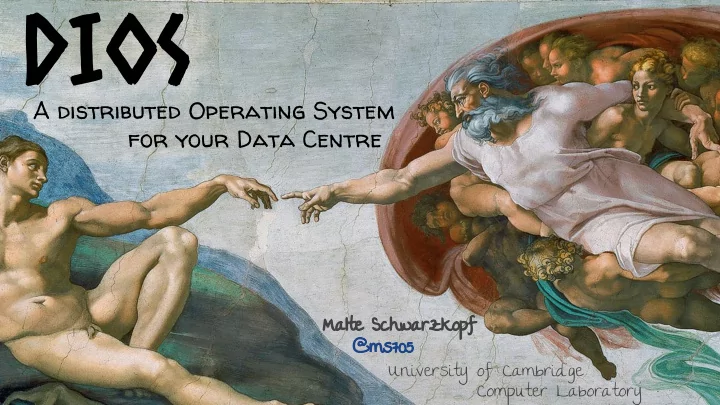

DIOS A distributed Operating System for your Data Centre Malte Schwarzkopf @ms705 University of Cambridge Computer Laboratory
Abstraction turtles all the way down... JSON, Protobuf object Cluster-level tasks Cached in-memory object User-level threads GFS, HDFS “file” OS kernel processes OS memory mapping VMs, Containers Kernel VFS file Hardware threads
Good for … abstraction portability BAD for... scalability data-flow tracking co-scheduling security locality optimisations
The plan: vertically integrate abstractions Distributed application Distributed infrastructure Distributed operating system All use: one distributed object abstraction
user job: web user job: user job: serving log analysis MapReduce distr. name distributed distributed KV cluster service file system store scheduler D IOS naming/ thread naming/ thread net net caps sched caps sched stack stack node kernel node kernel network coord. Machine A Machine B
Narrow syscall API: 11 system calls ref_id: 1234 persistent: false proximity: local Global naming: UUIDs for objects fate_shared: true buf_size: 4k “Translucency”: contextual references User ref_t a3c93 ref_id: 1234 f2379 kref_t Kernel name: a3c93f23798d 8d access: rw- parent: fc1cbc79ca12
Cluster Legacy hybrid DIOS process scheduler process process Host kernel “Legacy” syscalls DIOS syscalls DIOS extensions
user process User Kernel dios_dal_linux.ko kernel DIOS patch Adaptation (~500 LOC) Layer (DAL) D IOS core module dios.ko reference name table service
Demo time! (this is where the kernel crashes...)
input <”cat”, 1> M M M <”dog”, 1> map <”cat”, 1> <”fish”, 1> <”cat”, 2> R R reduce <”dog”, 1> <”fish”, 1> word count lists
Status: alpha (at best!) Work in progress: ❖ High-level language support (working on Rust runtime) ❖ libd C standard library ❖ MapReduce, web server, key-value store ...
Malte Schwarzkopf @ms705 in collaboration with Matthew Grosvenor Ionel Gog Andrew Scull Matthew Huxtable Gustaf Helgesson Steven Hand DIOS is a Cambridge Systems at Scale project: http://www.cl.cam.ac.uk/netos/camsas/
Gratuitous Docker slide :) ❖ DIOS is Docker-compliant ! ➢ isolate containers by restricting name resolution ➢ but DIOS objects can also be shared by containers ➢ Firmament scheduler can manage containers ❖ Benefits of DIOS + Docker ➢ data-flow tracking + IFC across containers ➢ can allow legacy syscalls within containers, but only DIOS syscalls on the host (“hypervisor mode”)
Task monitoring Pi approximation (CPU-bound) ~12,000 instr. per mem access 12.6% miss Matrix multiplication (memory-bound) ~40 instr. per mem access 65.6% miss
Concept slides Bullet points follow!
Why? ● Vertical integration of abstractions ○ enables optimisations, e.g. co-scheduling, locality ● Security, auditing, IFC ○ restrict and monitor data-flow ○ no way to bypass ● Because we can :)
How? ● Narrow syscall API: 11 syscalls ○ co-exist with POSIX, or replace ● Distributed object abstraction ○ object ~= “blob of bytes, stream of bytes or task” ● Security: distributed capabilities ○ Names: resolvable identifiers ○ References: FD-like handles with context info
Status? ● Prototype: Linux kernel extension ○ Tiny kernel patch (~500 LoC) ○ Two kernel modules ■ Adaptation layer: GPL ■ DIOS core: BSD ● HLL: Rust runtime port in progress
Demo! ● Simple streaming MapReduce ○ WordCount
Recommend
More recommend